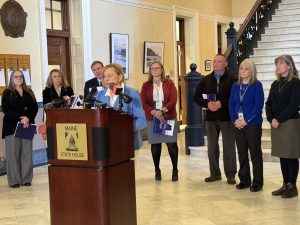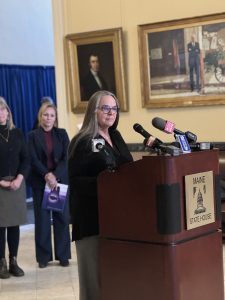Maine Domestic Abuse Homicide Review Panel Releases 14th Biennial Report

The Maine Domestic Abuse Homicide Review Panel released its 14th biennial report yesterday at a press conference at the State House. Speakers included Governor Janet Mills, Attorney General Aaron Frey, Assistant Attorney General Lisa Marchese, and MCEDV Executive Director Francine Garland Stark. The Panel, comprised of professionals from multiple systems and state agencies, reviews cases of domestic violence homicide, and sometimes cases where serious injury was inflicted but the victim survived, in order to identify what Maine is doing well and to make recommendations for how we can improve our response to both victims and perpetrators of domestic abuse and violence. This year’s report was dedicated to community- and court-based domestic violence advocates across the state, who “play a pivotal role in the safety of victims and in our legal system.”
Read the full remarks offered by Garland Stark below.
Find the full report here.

Remarks by Francine Garland Stark upon the release of the Maine Domestic Abuse Homicide Review Panel’s 14th Biennial Report.
Thank you, Lisa, Governor Mills, and Attorney General Frey. It is an honor to be here with you today.
I begin by extending my deepest condolences to the families whose beloved children, siblings, parents, or grandparents have been killed in domestic violence homicide. Each death is an immeasurable loss.
In each case it reviews, the members of the Homicide Review Panel are honoring the life or lives lost by seeking to understand what happened – not only in the moment of the homicide but in the time before. What might anyone have done to prevent this tragedy? What can each of us do differently? What may need to change in our laws and professional policies and practices?
The Panel has observed that in so many cases family, friends, neighbors, or coworkers were aware of domestic abuse occurring. And many provided help, while others felt helpless to do anything. If you find yourself in that position, a good first step is to call your local Domestic Violence Resource Center that is available 24/7 to talk with you about what is happening and help you think about next steps, resources, and strategies to keep yourself as a bystander and the person you are worried about safe. These resources are listed in the appendices of the report. In the 27 cases reviewed for this biennial report, only one of the victims had been connected with services from a Domestic Violence Resource Center.
In the past year, Domestic Violence Resource Centers across Maine provided services for 15,147 people, more than in any prior year. Among those served were 2,441 people calling to consult with advocates about what they could do to help someone about whom they were concerned. These were friends, family members, co-workers, law enforcement officers, child welfare workers, behavioral health professionals, and others – reaching out to explore next steps, for ideas about how best to connect victims of domestic abuse with support and resources to be safe and protected. Our network is there for the helpers – as a sounding board, as a practical resource, as emotional support, and as a refuge for the victims of domestic abuse you are trying to help. Never hesitate to reach out.
It is so important for all of us: professional responders, community, and family – to work together. As we rightly contemplate ways to improve how we intervene with people who commit crimes, centering the humanity of all involved, it is imperative that we not minimize the impact of harm done and potential lethality of those who choose to be abusive and violent against their intimate partners or families.
Here in the statehouse, critical conversations are happening every day, in which policy makers seek ways to keep Maine’s children safe, to reduce gun violence, to address the substance use crisis, and to reduce incarceration. Domestic violence intersects with all these issues – as either or both cause and outcome. In the cases reviewed for this report, perpetrators killed 4 children, and 29 children lost at least 1 of their parents or primary caregivers to homicide, incarceration, or suicide. Firearms were by far the most common method used to kill; substance use co-occurred with over half of the homicides; and 30% of the perpetrators had committed domestic violence against multiple intimate partners. In at least 10 of the cases reviewed, the person who went on to commit the homicide had made it known that they intended to do so, frequently threatening suicide as well. We must all take threats of homicide and suicide very seriously and seek professional intervention.
Domestic Violence Homicide is nearly always the culmination of years of coercive, controlling behavior that the abusive person has used to get what they want, submission to their demands, and control over the story being told about what is happening in their relationships. People who commit domestic abuse and violence frequently justify their behavior – blaming their own experiences of trauma, their jealousy, their substance use, their lack of role models, their poverty. All these things may be part of the picture, but none of them excuse abusive and violent behavior. Yet such intersecting truths make it hard for the people they abuse to break free and for professionals to hold them to account. No one wants to believe that someone they care about, respect, and understand to have suffered would go on to commit the most heinous of crimes – killing those who love them – but this report should serve as a clarion call to recognize that domestic abuse and violence can be lethal.
While it is difficult, dangerous, and expensive to separate from an abusive intimate partner, I want to emphasize that literally thousands of people in Maine successfully leave abusive partners every year and go on to live lives free from abuse. It is a hard journey, but there is help, and there is hope.
To those who are suffering domestic abuse today, I encourage you to call a domestic violence resource center for help. To those who recognize that you are doing harm to those you love, I encourage you to call one of Maine’s Certified Domestic Violence Intervention Programs and find support on a path to change.
I would like to close with gratitude:
First, to the members of the Homicide Review Panel for their extraordinary dedication to this work.
Second, the team of Victim Advocates in the Attorney General’s Office for their heartfelt support for the surviving families in homicide cases. And to advocates all over Maine, in District Attorney’s offices, at the Department of Corrections, and in Domestic Violence Resource Centers across the state and in tribal communities – helping survivors find paths to safety every day.
And the Maine State Police – for their painstaking investigations of these homicides and their daily efforts, along with colleagues in all Maine’s law enforcement agencies, to respond to non-lethal domestic violence effectively, investigating thoroughly, assessing risk, arresting, and following up consistently to build strong cases, connect victims with advocates, and prevent homicide.
I thank Lisa Marchese for her leadership of the Homicide Review Panel for these 22 years of case review. The thoughtful recommendations in the report have informed changes in Maine law that increase accountability for those who commit abuse and resources for victim/survivors.
And many thanks to Governor Janet Mills for her commitment to keeping all Maine people safe – from global pandemics and the devastating impact of climate change and from the persistent plague of domestic violence.
Thank you.

